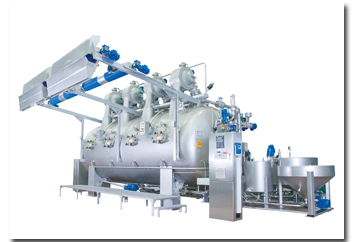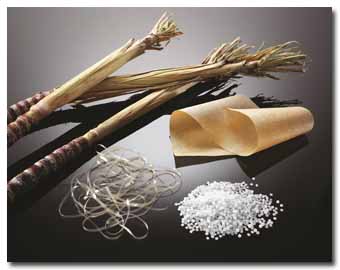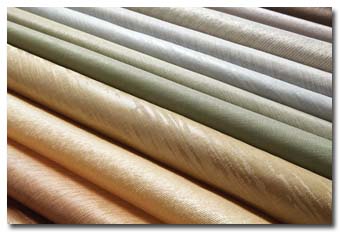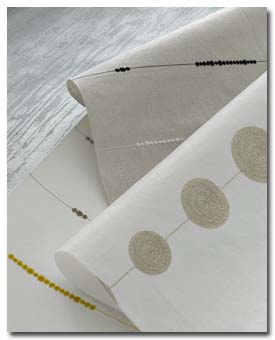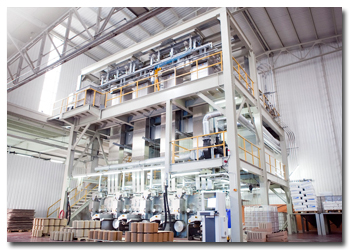LONDON — June 25th, 2013 — Bordeaux Digital Printink, a leading innovator of a wide range of inks
and coatings for a variety of demanding inkjet applications, printing technologies and techniques,
today announced that it will launch its Latex based inks at the FESPA 2013 conference, June 25 –
29, in London, UK, at the Excel London Exhibition Center, stands D12S/E10S. The new water
based inks extend Bordeaux’s comprehensive range of inks and solutions further and raise the bar
for environmentally friendly printing.
Bordeaux will highlight the new EDEN TX™ Latex based ink for textiles, a unique water based
ink for digital printing on a very wide variety of natural, synthetic and blended fabrics without
pre-treatment, multiple printing devices or several types of ink. This odorless ink offers
extremely rich and high density colors, excellent color vibrancy and soft feeling fabrics, making
it an excellent choice for the demanding environments of garment and apparel, decorative and
industrial textile printing applications. Bordeaux’s EDEN TX currently supports Epson®
DX-4™/DX-5™/DX-6™/DX-7™ printheads, as well as industrial printheads such as Ricoh® Gen4. Available
colors are C, M, Y, K, Lc, and Lm.
Latex printing will be visible on three printers in the Bordeaux stand and in Bordeaux’s
partners’ stands at FESPA 2013, two dedicated for textile printing on cotton and polyester and
another demonstration of a Latex converted solvent Mutoh printer printing with Bordeaux’s EDEN LX™
Latex-based ink. Designed for simple and seamless conversion of solvent based printers equipped
with Epson DX printheads, EDEN LX demonstrates superb performance comparable to eco-solvent inks,
on a wide array of substrates including most solvent and water designated substrates.
“At this year’s FESPA we are demonstrating the versatility and exceptional quality and cost
effectiveness of our environmentally friendly solutions. Our revolutionary Latex based ink series
is odor free, offers excellent durability, superior adhesion, high light fastness and outstanding
elongation properties, making it an excellent alternative to solvent ink for indoor and
outdoor applications,” said Moshe Zach, CEO and founder of Bordeaux Digital Printink. “All this,
while providing 30% to 50% lower ink consumption compared to OEM Eco solvent ink.”
“Bordeaux’s new Latex based ink for textiles builds on our track record of innovative
industry first solutions and enables more efficient digital textile printing,” added Zach. “Best of
all, EDEN TX ink has the ability to precisely match colors even on garment fabrics made up of a
blend of two or more fiber types and produce garments with a soft feel, excellent wash fastness and
light fastness. It is a true breakthrough in the digital textile printing field, ideal for fast and
hassle free short run garment and apparel, decorative or industrial textile printing applications.”
Bordeaux’s water-based ink demonstrations include the first showing of its EDEN SD™ Direct
Sublimation ink. This ink produces washable and color-fast images on Polyester fabrics which can be
used for flags & banners, sports apparel, indoor furnishings, fashion items, tents and more.
Bordeaux will be showcasing its recently announced Eco solvent ink for Epson Surecolor® S
series printers. Mix & Match with Epson UltraChrome GS2 in, this eco-friendly ink is available
in 1L bags for Smart bulk ink delivery systems, provided by InkOnDemand.com, a Bordeaux partner
company.
Environmentally friendly printing will be visible in the UV LED area of the stand, where
Bordeaux will demonstrate its UV LED flexible ink printing on rigid substrates. Bordeaux’s UV
and UV LED ink series cover a very wide range of rigid, flexible and super flexible solutions for
all types of indoor and outdoor applications.
As a key supplier of cost effective solutions to the wide format digital printing industry,
Bordeaux is exhibiting its complementary UV based primers for pre-print to enhance adhesion on
challenging rigid surfaces such as plastic and glass as well as innovative encoder solutions,
advanced bulk solutions and a wide range of coatings for post printing. Bordeaux’s Clear
water based laminates for post-print improve durability and enhance image of outdoor signage and
fleet graphics. The complementary UV coatings for wide format provide additional features
depending on the application such as gloss, matte or anti-slip characteristics.
Visit Bordeaux at FESPA London, the largest focused event for the wide format print industry,
on stands D12S/E10S at the ExCel London Exhibition Centre during June 25 – 29 2013.
Posted on July 2, 2013
Source: Bordeaux Digital Printink

